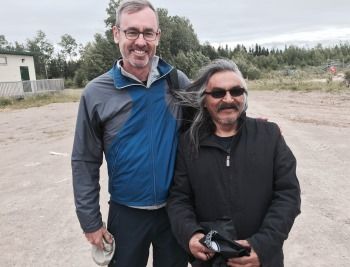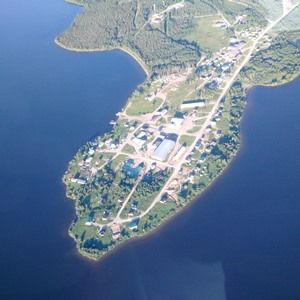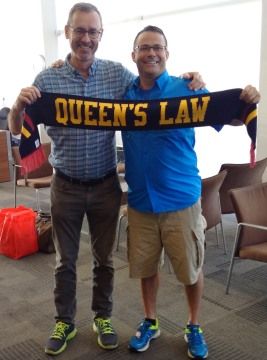


Dean Bill Flanagan participated this summer in a “reconciliation trip” to a remote First Nations community in northern Ontario in order to better understand the barriers and challenges facing the youth who live there.
“At Queen’s Law, we are committed to working closely with First Nations communities to enhance our outreach efforts and increase the numbers of Aboriginal students in our programs,” says Flanagan. “This trip offered me an important opportunity to learn more about First Nations people in Canada and help build the Faculty’s capacity to attract, retain and support increased numbers of Aboriginal students.”
The dean made the trip to Kitchenuhmaykoosib Inninuwug (KI), a fly-in community located 600 km north of Thunder Bay on Big Trout Lake, on the invitation of KI youth leaders. They wanted to open their homes to interested Canadians to spark an honest dialogue about living conditions and to share their pride in the beauty of their culture and land. KI residents have done this in the past, and guests have included Sophie Rhys-Jones, Countess of Wessex, Ontario Premier Kathleen Wynne and Ontario Lieutenant Governor Elizabeth Dowdeswell.
Flanagan says the trip was personally moving – many of the families are struggling with difficult social issues, including poverty, a lack of opportunity for the community’s youth, and drug and alcohol abuse.
“Although the community faces many challenges, I was also very impressed with the community’s resilience and determination,” he said. “I left with great hope – this is a community that is very proud of its cultural roots with a strong connection to the land. There are also inspirational youth leaders in KI working to make change, as demonstrated in their leadership in organizing the KI Reconciliation Trip.”
During his time in KI, Flanagan stayed as a guest at the home of Chief Donny Morris and his family, and participated in local events, ceremonies and school visits. The dean made the week-long trip with Law’95 alumnus David Sharpe, a member of the Mohawks of the Bay of Quinte, Tyendinaga Mohawk Territory near Deseronto, Ont.
Sharpe is the alumni ambassador for Aboriginal student recruitment for the Faculty of Law and president and chief operating officer of Bridging Finance, which provides small- and medium-sized North American companies with alternative financing options. Bridging Finance is also one of the only bridge lenders in Canada to First Nations for infrastructure projects. He also serves as chair of the Board of Governors for First Nations University in Saskatchewan, and has strong connections to Aboriginal causes in Canada, including the Eabametoong Economic Development Corporation, Native Child and Family Services of Toronto and Indspire Institute for Inuit and Aboriginal student mentoring.
“People can read about First Nations communities in newspapers and online, but until they go and see what’s happening, they don’t have the first-hand knowledge that’s needed to speak honestly about the challenges,” says Sharpe. “Those who came on this trip were very moved by the experience. When we landed in KI, several were very emotional, even at this early point. It’s difficult. The future for many there is bleak, and that is shocking to see.”
Sharpe, who is active in recruiting Aboriginal students to Queen’s Law, says education is the best route out of difficult circumstances. However, most children in KI do not finish high school because Grades 11 and 12 are not available at the local school – the youth must travel to Thunder Bay in order to complete their secondary education. Many children are reluctant to leave the community to complete high school and many of those who do travel to Thunder Bay find it difficult to thrive in a program so far away from their support systems at home.
“I really admire Dean Flanagan for making this trip,” says Sharpe, “and I’m proud of Queen’s for all the work the university is doing to improve Aboriginal engagement.”
Information on Aboriginal-focused programs and initiatives at Queen’s University is available from Queen’s Four Directions Aboriginal Student Centre.
Queen’s Law has a dedicated admissions category for Aboriginal students.